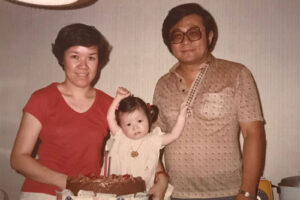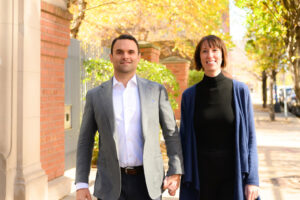Whether it involves previvorship, diagnosis or survivorship, it takes a village of professionals in varying fields to ensure a patient is on the best path for their personal journey. This multidisciplinary approach in cancer care can be a well-oiled machine where all parts can efficiently work together in harmony to be successful. With the introduction of the novel coronavirus, this process has become fragmented, especially when it comes to addressing mental health concerns among cancer warriors.
Throughout the COVID-19 pandemic, warriors not only have limited or no access to physical health services, but mental health services have also been impacted. An October 2020 World Health Organization survey found that the pandemic has disrupted or halted mental health services in 93 percent of countries worldwide. In a time where most are experiencing increased grief, anxiety, fear and isolation, warriors are especially vulnerable.
Due to warriors being immunocompromised or high-risk for contracting the COVID-19 virus, health care professionals are more cautious than ever when it comes to meeting face-to-face for outpatient visits. While this bodes better for a warrior’s physical health than frequent trips to hospitals or numerous in-person interactions, a 2020 U.K. study in journal Psycho-Oncology found that this lack of face-to-face monitoring results in less warriors being referred to psychosocial services. For those who do engage in psychosocial services, the quality of care is often diminished.
North Carolina minister and influencer Tamron Little is a mesothelioma warrior who says before the COVID-19 pandemic, her mental health—which includes a PTSD diagnosis—was fairly manageable. However, after the novel coronavirus began greatly impacting life in the U.S., Little noticed her mental health struggles worsening.
“I think COVID has interrupted a lot of things, and having to stay socially distanced was hard,” says Little. “To be honest, I was petrified when I heard about COVID-19. My husband is also a cancer survivor, so I was so scared that one of us would catch it. I was really on edge all the time and I think that’s what triggered my anxiety and caused constant panic attacks. It affected my mental health greatly.”
Little eventually contracted the virus. In August 2020, she experienced shortness of breath, a partially collapsed lung and dehydration, as well as an ambulance ride to the hospital at one point for low oxygen levels. She says her anxiety “went through the roof” while ill due to the uncertainty of how she would weather the virus as a warrior. Dealing with immense bouts of fear, Little worried that having the virus might mean facing the end of her life.
This increased stress and anxiety for warriors can almost be as harmful as the virus to one’s overall well-being. Chronic stress from anxiety, panic attacks or sleeplessness can materialize physically and impact your health. Managing your mental health should be a top priority in these unprecedented times.
An October 2020 World Health Organization survey found that the pandemic has disrupted or halted mental health services in 93 percent of countries worldwide.
Little started attending therapy, which she says has helped immensely. With the pandemic, most counseling and therapy services have shifted to virtual or phone appointments. Telehealth sessions can work for certain warriors and even increase access to care for some, but others may find speaking to a new therapist over the phone or via Zoom not as effective as talking to someone in-person. The Psycho-Oncology study found that telehealth assessments between patient and specialist were “more difficult, particularly if there was no existing relationship between the two, making it harder to form a therapeutic alliance.” It’s important to try different methods and see what works best for you.
For those who find that virtual therapy doesn’t resonate, there are some other practices one can take up in the meantime. Little found the meditation apps Calm and Headspace during the pandemic and she still uses them in addition to her therapy. The breathing techniques for various forms of anxiety or depression have helped keep her grounded, she says. The platforms also offer a community feature so you can connect with others going through similar experiences.
This sense of community is extremely valuable. Warriors may have been experiencing some isolation prior to the pandemic due to rigorous treatments or an immunocompromised status, and lockdowns have only increased that physical and psychological burden. While connecting virtually with others—whether strangers or loved ones—may not feel the same as being together in person, having someone to lean on can make all the difference when it comes to your mental health.
While it’s fortunate that these additional resources exist, there is cause for concern on the way psychosocial needs of cancer warriors have still managed to fall through the cracks amid a worldwide health crisis.
In the U.S., the Department of Health & Human Services does discuss available mental health services to interested parties who have tested positive for SARS-CoV-2. But for warriors who either have not contracted the virus or have contracted it and don’t recognize that mental health assistance is an option, it may not be apparent that such resources exist or are needed. If someone is experiencing psychological struggles, they may not be motivated to reach out for help or may feel uncomfortable or embarrassed due to stigma. With decreased face-to-face care during the pandemic, many warriors’ mental health can then take a backseat if their doctor isn’t following up on symptoms beyond physical.
Researchers behind the Psycho-Oncology study are calling for a period of global reflection from professionals to learn from this lapse in psychosocial care for cancer warriors. Services, teams and warriors have adapted in creative and flexible ways, but barriers and limitations do still exist. It’s important to continue monitoring the strengths and weaknesses of current options to better serve the oncology world when it comes to mental health moving forward.
If you’re currently experiencing increased mental or emotional distress, consult with your health care team for resources or a plan of action. For additional resources and tools in the U.S., visit hhs.gov/coronavirus/mental-health-and-coping. For a comprehensive list of resources on managing your mental health from home, including spaces to connect with others, visit mhanational.org or nami.org.







